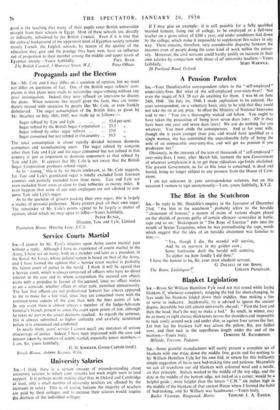Service Courts Martial SIR,—I cannot let Mr. Eyre's stricture upon
Army courts martial pass without a reply. Although I have no experience of courts martial in the Army, 1 have sat on many, both as a member and later as a president, in the Royal Air Force, whose judicial system is based on that of the Army, and I have formed the opinion that a Service court martial is probably the fairest court of justice in the world. I think it will be agreed that a Service court, which is always composed of officers who have no direct interest in the case and to whose composition the accused can object, starts with a prejudice in favour of the accused, since no officer wishes to see a comrade, whether officer or other rank, punished unnecessarily. The fact that officers are not professional lawyers has always appeared to me to make for a fair trial, since they are concerned more with the common-sense aspects of the case than with the finer points of law. In any event there is almost always a member of the Judge-Advocate General's branch present to assist the court upon points of law, although he takes no part in the actual decisions reached. As regards the sentence, this is always submitted to higher authority and carefully scrutinised before it is announced and confirmed.
In nearly thirty years' service I cannot recall any instances of serious miscarriage of justice. Indeed, I have been impressed with the care and interest taken by members of courts martial, especially junior members.— I am, Sir, yours faithfully,


































 Previous page
Previous page